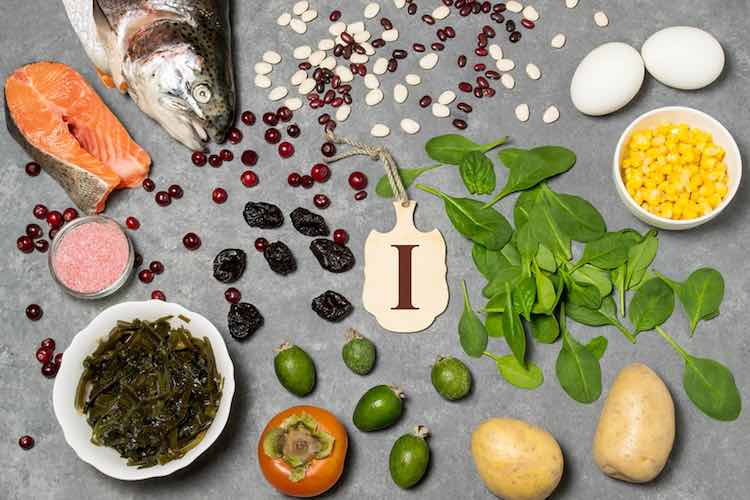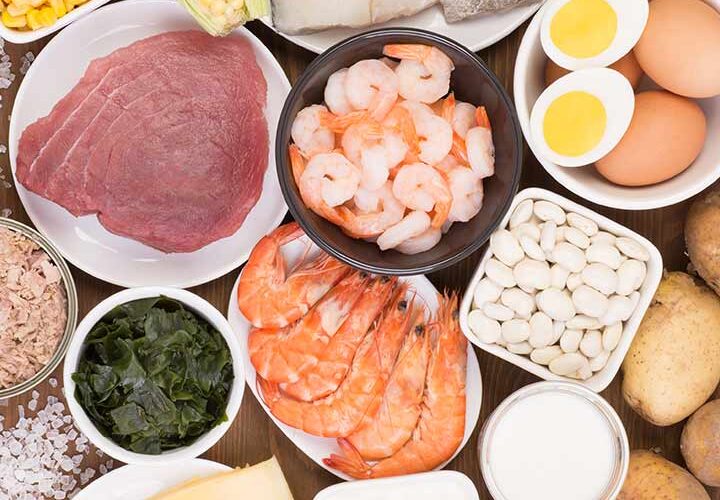Diet rich in iodine for hypothyroidism, what about it ? The special hypothyroidism diet aims to avoid weight gain and to provide the nutrients necessary for the proper functioning of the thyroid gland , itself involved in the proper functioning of the body. stay with us for more healthy recipes inspiration
The essential points of the special Diet rich in iodine for hypothyroidism
- Adopt a diet rich in iodine;
- Avoid goitrogenic foods;
- Avoid foods that interfere with Levothyrox treatment;
- Stock up on nutrients necessary for the proper functioning of the thyroid;
- Maintain good hydration.
Hypothyroidism and weight gain: recommended foods
To avoid weight gain and improve comfort of life, the special hypothyroidism diet must be rich in iodine and nutrients participating in the synthesis of thyroid hormones:
- Selenium;
- Vitamin B12;
- Vitamin D.
Foods rich in Iodine
The daily iodine requirement for an adult is 150 micrograms per day. Generally speaking, iodine is found in the following foods that should be consumed regularly
- Seafood ;
- Algae;
- Fish (especially cod and haddock);
- Milk and dairy products;
- Table salt enriched with iodine (380 micrograms for 5ml).
Selenium source food
Selenium contributes to the proper functioning of the thyroid gland, so it is recommended to consume enough of it as part of the special hypothyroidism diet.
Sources of selenium are:
- Brazil nut ;
- Oily fish;
- Seafood ;
- Meat and poultry ;
- Shiitake mushrooms;
- Eggs;
- Whole grains.
Foods rich in Vitamin B12
Like selenium, vitamin B12 contributes to the optimal functioning of the thyroid. It is estimated that 30% of people with hypothyroidism suffer from vitamin B12 deficiency. It is found in the following foods:
- Molluscs
- Seafood
- Offal
- Fish
- Meat and poultry
- Eggs;
- Dairy products
- Enriched soy milk
- Whole grains
- Dietary yeast.
Vitamin D
90% of people with hypothyroidism are deficient in vitamin D. It is therefore essential to ensure that they have a good intake as part of the diet specific to hypothyroidism. Food sources of vitamin D are:
- Milk and fortified soy drinks
- Oily fish
- Margarines
- Egg yolk
- Shiitake mushrooms.
Low-fat foods
Here are some low-fat products to include in the special hypothyroidism diet:
- Lean meats (roast, fillet, escalope, loin, shoulder)
- Fish
- Poultry without skin
- Low-fat dairy products
- Skimmed milk.
Hypothyroidism: are there prohibited foods?
In addition to eating a diet rich in iodine and taking Levothyrox , certain foods should be avoided if you have hypothyroidism.
Indeed, certain foods can have a goitrogenic effect and slow down the functioning of the thyroid gland. This is because they interfere with drug treatment or promote weight gain. These include, for example, soya, certain plants, fats and certain vitamin supplements.
Goitrogenic: foods
Certain so-called goitrogenic foods should be avoided as part of the special hypothyroidism diet. They slow down the functioning of the thyroid gland and prevent it from absorbing iodine, an essential element for the production of thyroid hormones.
Goitrogenic foods to avoid in case of hypothyroidism and Levothyrox treatment are:
- Brussels sprouts
- Cabbage
- Cauliflower
- Kale
- Broccoli
- Mustard greens
- Watercress
- Turnip
- Rutabaga
- Sweet potatoes
- Soya beans
- Peanuts
However, cooking inactivates the goitrogenic effects of these foods.
Soy
Soy would have goitrogenic effects only in cases of iodine deficiency. On the other hand, soy is known to impair the absorption of Levothyrox. It is therefore strongly advised to avoid soy-based foods while taking this medication.
Soy foods to avoid if you have hypothyroidism are:
- Tofu
- Tempeh
- Soybeans and seeds
- Edamame
- Soy milk-based drinks
- Textured soy proteins
- Soy-based plant-based steaks
- Soy yogurts
However, in the absence of hypothyroidism, soy consumption does not affect the functioning of the thyroid gland. It is therefore not necessary to limit its consumption, especially as it has an interesting nutritional profile
Foods high in fat
In addition to slowing down weight gain linked to hypothyroidism, limiting fat consumption also helps reduce the risk of cardiovascular disease.
Milk and yogurts should not contain more than 2% fat and cheeses should not contain more than 20% fat.
You should also avoid added fats, which quickly increase total fat intake:
- Butter
- Oils
- Dressings
- Sauce
Women should not exceed 6 servings of added fat per day, men 8. One serving of added fat corresponds to:
- 1 level tablespoon of oil or melted butter
- 15ml vinaigrette
- 1 heaped teaspoon of mayonnaise
- 1 tablespoon of oilseed puree (almonds, cashew, sesame, etc.)
- 7 olives
- 2 teaspoons barbecue sauce
- 2 tablespoons of liquid cream with 15% fat
- 30g of cheese.
Alcohol and coffee
Consumption of alcohol and coffee should be limited and not take place around the time of treatment. Allow at least 1 hour between the two to avoid interference.
Other foods not recommended
- Industrial products and already prepared dishes
- Simple sugars
- Refined products
Practical daily advice for following the special hypothyroidism diet
- Split your diet by having 3 small meals and 3 snacks per day
- Balance your plate correctly: 1/2 vegetables, 1/4 meats or alternatives and 1/4 starchy foods
- Move as much as possible and practice at least 30 minutes of physical activity per day
- Choose table salt enriched with iodine
- Instead of fatty sauces, consider yogurt and herb-based sauces to accompany your dishes
- Eat slowly and calmly, take the time to listen to food sensations
- To combat constipation, drink a large glass of very cold water in the morning on an empty stomach
- Choose breads and starchy foods made from wholemeal flour.
For further
Hypothyroidism and hydration
Since constipation is a common symptom of hypothyroidism, it is important to maintain proper hydration. To do this, you should ideally drink 2 liters of water in small, well-distributed quantities throughout the day.
Water is the only essential drink; it is not recommended to consume syrups, juices or sodas on a regular basis
Levothyrox and iron, calcium and fiber supplementation
If you take iron, calcium or fiber supplements, it is advisable not to consume them while taking Levothyrox.
You should wait 4 hours between the two because these supplements compete with the treatment and can reduce its effec.

